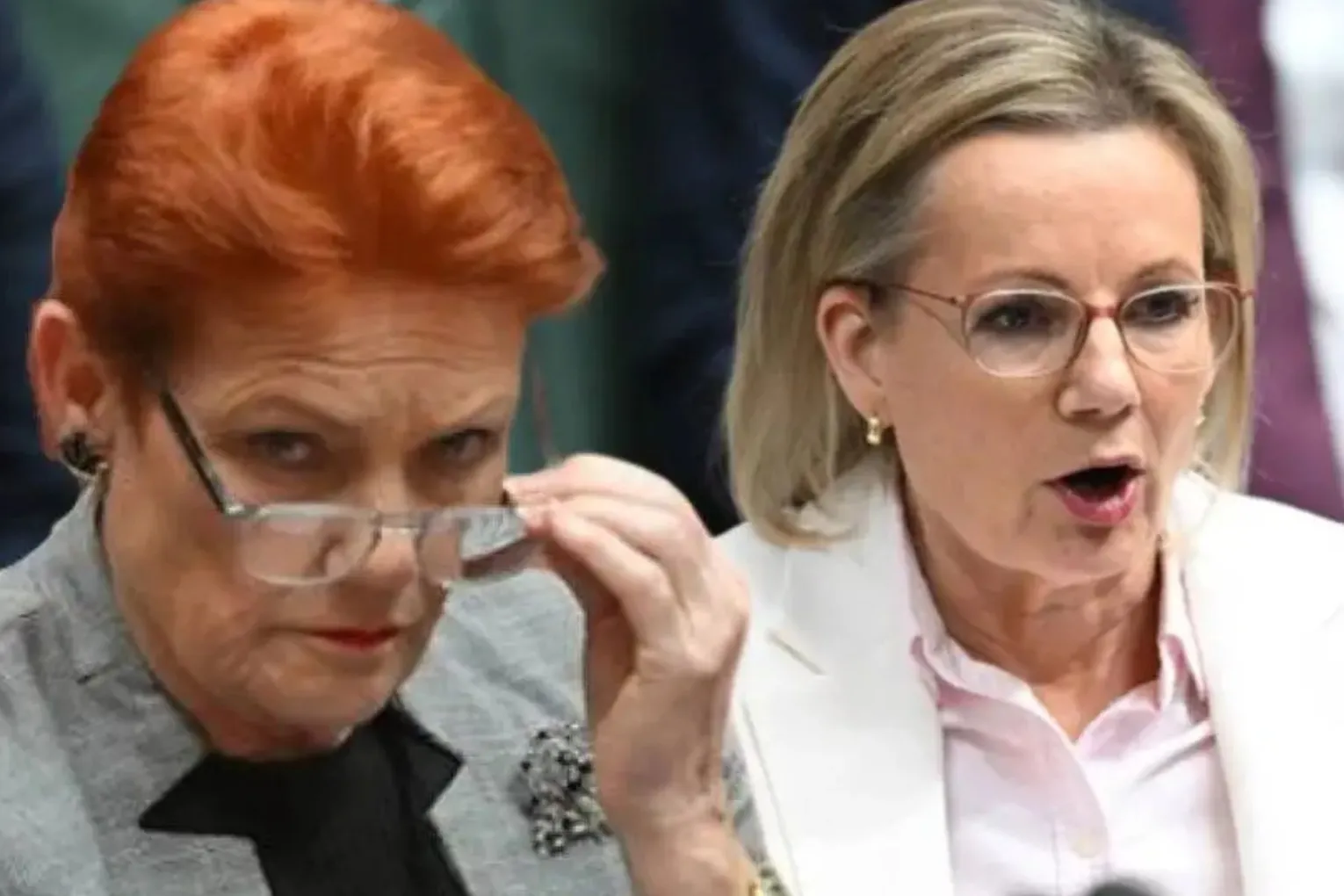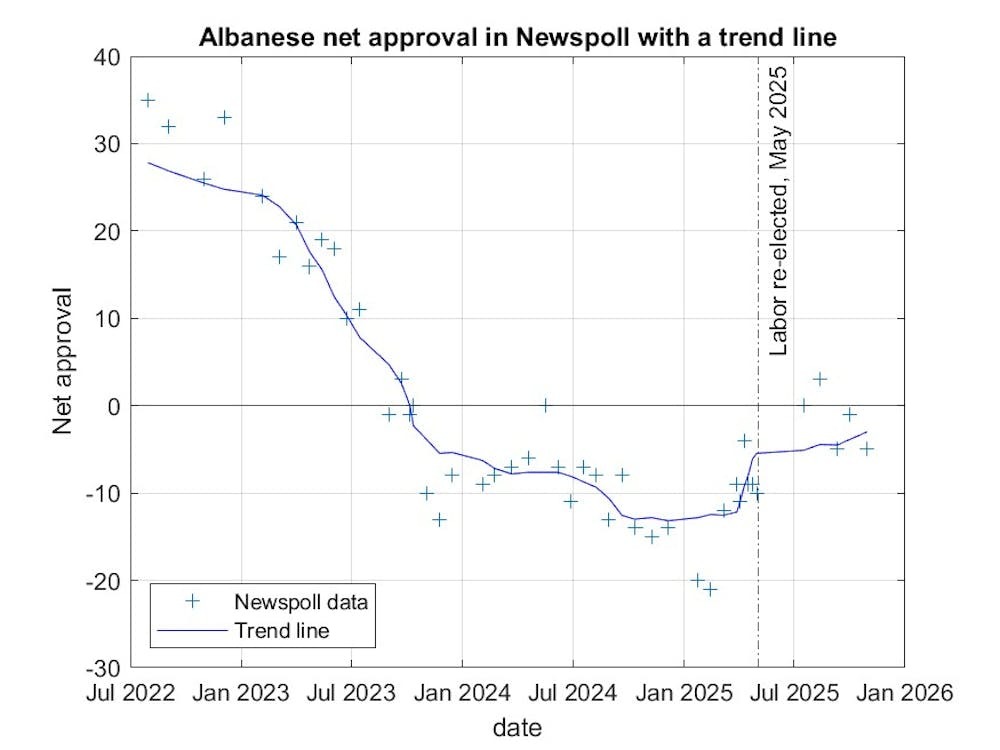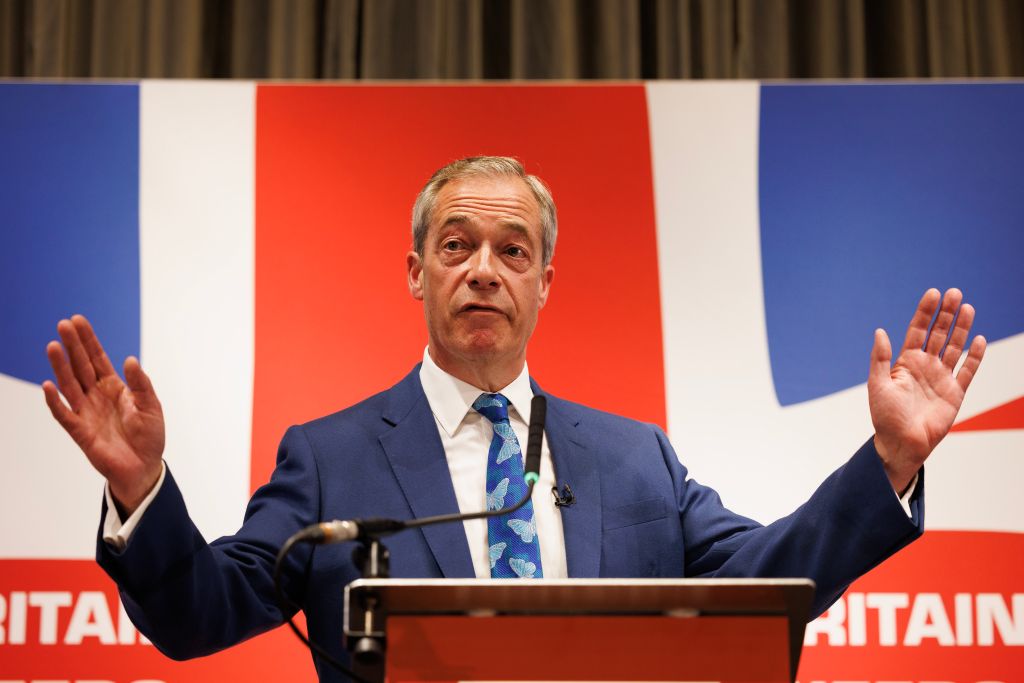One Nation could overtake Coalition as Australia’s conservative opposition
Far-right parties have already overtaken centre-right parties in some European countries, but is Australia on the same trajectory? Adrian Beaumont explains.

Australia may be on a trajectory where One Nation overtakes the Coalition to become the nation’s main right-wing party.
The Coalition’s primary vote slumped four points to a record low 24 per cent in the latest Newspoll, while One Nation was up four points to a record high 15 per cent.
You might like
One Nation also surged to 15 per cent in an Essential poll.
The national Newspoll, conducted October 27–30 from a sample of 1265 voters, gave Labor a 57–43 per cent lead over the Coalition, unchanged from the previous Newspoll in early October.
Primary votes were 36 per cent for Labor (down one point), 24 per cent for the Coalition (down four points), 15 per cent for One Nation (up four points), 11 per cent for the Greens (down one point) and 14 per cent for all others (up two points).
Analyst Kevin Bonham said the poll set or matched a few records:
- the worst Coalition primary vote ever in a public national poll
- a tie for the highest One Nation vote in a national poll, matching last week’s Essential poll
- the lowest combined vote for Labor and the Coalition in Newspoll history.
The Coalition’s previous worst primary vote was 27 per cent in a mid-September Newspoll.
In the new Newspoll, Prime Minister Anthony Albanese’s net approval was down four points to -5, with 51 per cent of voters dissatisfied with his performance and 46 per cent satisfied.
Opposition leader Sussan Ley’s net approval slumped 13 points to -33; she has dropped 24 points since August.
Albanese led Ley by 54–27 per cent as better prime minister, compared to 52–30 per cent in early October.
This is the graph of Albanese’s net approval in Newspoll with a trend line. Labor easily won the 2025 election, despite his ratings being negative at the time.

Source: Newspoll
One Nation possibly overtaking the Coalition follows a global trend. Far-right parties have already overtaken centre-right parties in some European countries.
In the United Kingdom, the Election Maps UK poll aggregate has the far-right Reform party leading with 30.5 per cent, followed by Labour at 19.1 per cent, the Conservatives at 17.5 per cent, the Liberal Democrats at 13.4 per cent and the Greens at 12.6 per cent.
With the UK’s first-past-the-post voting system, Reform would win a majority of House of Commons seats on this polling.
Even if One Nation overtakes the Coalition in Australia, the Australian Labor Party has a far higher primary vote than UK Labour.
I expect Coalition preferences would favour One Nation, but as long as the combined vote for Labor, the Greens and left-leaning others holds up, One Nation wouldn’t win an Australian election.

Nigel Farage’s reform party has overtaken Labour and the Conservatives in polls. Photo: AAP
Essential poll: One Nation surges
The national Essential poll, conducted October 22–26 from a sample of 1041 voters, gave Labor a 50–44 per cent lead over the Coalition by respondent preferences, including undecided voters. Labor’s lead was 51–44 per cent in late September.
Primary votes were 36 per cent for Labor (up one point), 26 per cent for the Coalition (down one point), 15 per cent for One Nation (up two points), 9 per cent for the Greens (down two points), 8 per cent for all others (up one point) and 6 per cent undecided (steady).
By 2025 election preference flows, Labor would lead the Coalition by a more than 55–45 per cent margin.
Albanese’s net approval was up three points in the Essential poll to +1, with 45 per cent of respondents approving of his performance and 44 per cent disapproving. Ley’s net approval was down two points to -11.
On Albanese’s October 20 meeting with US President Donald Trump in Washington, 37 per cent thought it was good for Australia’s long-term interests, 18 per cent bad and 26 per cent said it would have no real impact.
On the direction the Liberals should take to provide an alternative government, 48 per cent of total respondents said they should adopt more progressive positions, 24 per cent more conservative positions and 28 per cent thought they should maintain their current positions.
Among only Coalition voters, 49 per cent were in favour of more progressive positions, compared to 29 per cent for more conservative.
Ley was thought best to lead the Liberals by 13 per cent of total respondents, followed by Andrew Hastie and Jacinta Price at 10 per cent each, with 42 per cent unsure. Among only Coalition voters, Ley had 22 per cent, Hastie 20 per cent and Price 13 per cent.
Overall, respondents supported Australia’s target to reach net-zero emissions by 2050 by a 44–27 per cent margin. Among only Coalition voters, this support shrank to 38 per cent, with 35 per cent opposed.
Argentina and Trump’s ratings slide
In Argentina’s midterm elections on October 26, far-right President Javier Milei’s Liberty Advances party made decisive gains in both chambers of the legislature, though it still remains short of a majority. I covered these elections for The Poll Bludger.
In the United States, Trump’s net approval rating in analyst Nate Silver’s aggregate of US national polls has dropped to -11.8 (with 54.6 per cent of Americans disapproving of his performance, compared to 42.9 per cent approving). This is down 4.2 points since October 20.
Trump’s falling approval ratings could be linked to the ongoing government shutdown in the US, which began on October 1 and is now poised to become the longest in US history, breaking the 35-day record set during Trump’s first term.
Voters will head to the polls on Tuesday in the US in several key elections, including the governorship in Virginia and New Jersey and the mayoral race in New York City.
Democratic front-runner Zohran Mamdani has led independent candidate and former New York Governor Andrew Cuomo in the New York City race, though the polls have tightened in recent days.
Adrian Beaumont is an election analyst (Psephologist) and Honorary Associate at the University of Melbourne’s School of Mathematics and Statistics.
This article is republished from The Conversation under a Creative Commons license. Read the original article.





